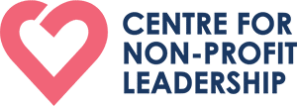Intergenerational incarceration is the risk faced when children of incarcerated parents break the law and end up in jail, which on average, can be 2.5 times more for children whose parents are incarcerated than those who are not.
A major factor in overcoming this is having strong family bonds as noted by a 2020 study done by MSF and NCSS which also highlighted the “importance of supporting families of offenders, to break intergenerational cycles of offending”. But just how can this be done?
New Life Stories (NLS) has an answer.
Inspiring young minds, Creating new life stories
NLS is a child-centered non-profit organisation that uses storytelling, family therapy, and relationship building to heal existing relationships between incarcerated parents and their children.
Its mission is simple – to prevent intergenerational incarceration, to reduce re-offending, and to improve the quality of life while increasing community inclusion for these families. NLS’s initiatives are oriented towards the childrens’ best interests, allowing them a safe space for emotional expression.
As part of NLS’s four-pronged Family Strengthening Programme, children in the Befriending Programme are taught essential reading and pro-social skills to ensure they are not left behind in the early years of development. This is complemented by their Incare Programme conducted by trained counsellors that prepare incarcerated parents for reintegration into society, family care & therapy activities, and active case management for all their families.
You’ve Got a (Learning) Friend in Me
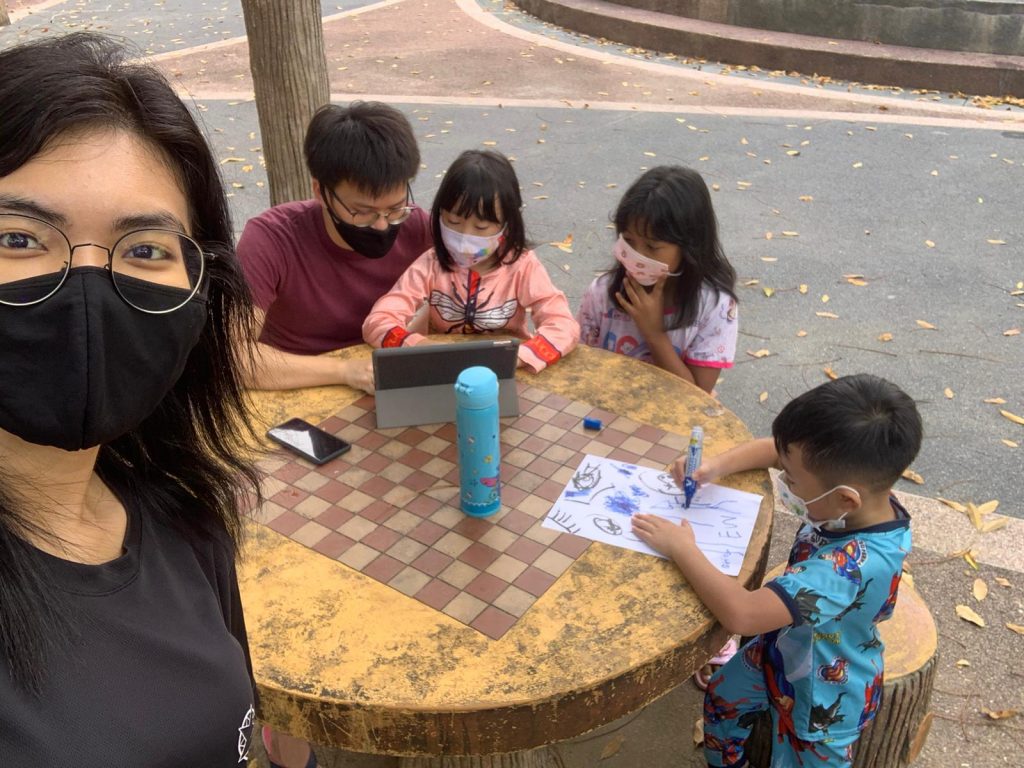
To achieve its mission, NLS harnesses the power of volunteers through their Befriending Programme, which focuses on building ‘a trusting relationship with the children or ‘Early Readers’, instill the joy of learning, improve their English literacy through reading, and boost their confidence and pro-social skills so that they can be school-ready’.
Known as Learning Friends, these volunteers are the first point-of-contact NLS has with the children of incarcerated parents. As Saleemah Ismail, Founder and Executive Director of NLS notes, “volunteers’ presence serves to remind the children of what an expression of love looks like”. Learning Friends acts as a stepping-stone in rebuilding trust in interpersonal relationships.
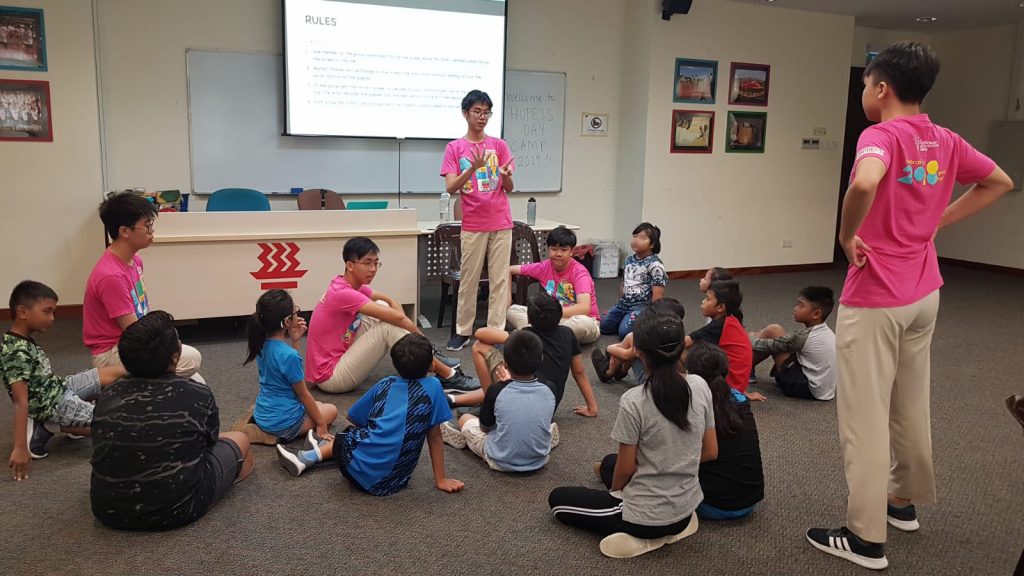
Through weekly hourly meetings, Learning Friends engage with their Early Readers through activities such as reading, storytelling, and everyday conversations with the children. They also lead experiential learning field trips to locations such as the Science Centre and Sungei Buloh Wetland Reserve. With the Covid-19 pandemic, however, these trips have transformed into virtual workshops and programmes.
A Specially Crafted Community Journey
With Learning Friends serving as the vital bridge to the children, NLS’s priority is to prepare and support their volunteers to excel in this integral role. Crafting a comprehensive volunteer community journey is crucial.
The Community Journey Cycle is a guiding framework useful for defining a community member’s journey through their stay in a community. It focuses on three main phase
- Entry: when members are typically recruited or selected and onboarding programmes are conducted
2. Experience: when members are encouraged to participate and contribute to the community’s needs; additional training or leadership opportunities are conducted to develop members
3. Exit: when feedback can be gathered on the journey to improve future journeys as well as to explore possible ways to recognise members’ contributions; this may serve as a transition to a potential alumni network

NLS believes in five essential components to their volunteer management plan: (1) comprehensive volunteer management tools, (2) purposeful volunteer recruitment, (3) long-term and consistent volunteer engagement, (4) regular communication and holistic support, and (5) varied volunteer recognition.
In framing these five components to the community journey of the needs of their Learning Friends, NLS ensures that volunteers are equipped to best serve the children.
Each Step Catered to Specific Needs

NLS’s unique approach ranges from attracting potential volunteers to retaining current members and advocating for NLS’s mission. This ensures that Learning Friends are not only physically and mentally prepared to address the needs of the children, but are also able to create meaningful and long-lasting relationships with the children.
A pathway is created for Learning Friends to hone their people skills while imparting values such as patience, kindness, and resilience. They also develop their skills in communication and collaboration. The plethora of experiences Learning Friends gain enables them to navigate their own futures as well.
Attract and Match
Potential Learning Friends are first screened, trained, and matched to beneficiaries. As the interaction between volunteers and children is typically one-on-one, NLS considers the profile of both the children and their volunteers to create ‘sticky’ relationships to ensure a low attrition rate.
Learning Friends are interviewed about their preferences, experiences (such as with Disabled persons), and availability. Bus routes to homes are matched to reduce volunteer attrition, emphasising how neighbourhood communities can contribute to achieving the prevention of intergenerational incarceration. Such purposeful, considerate, and customised volunteer plans ensure a sustainable relationship where volunteers can effectively carry out their responsibilities.
Train and Support
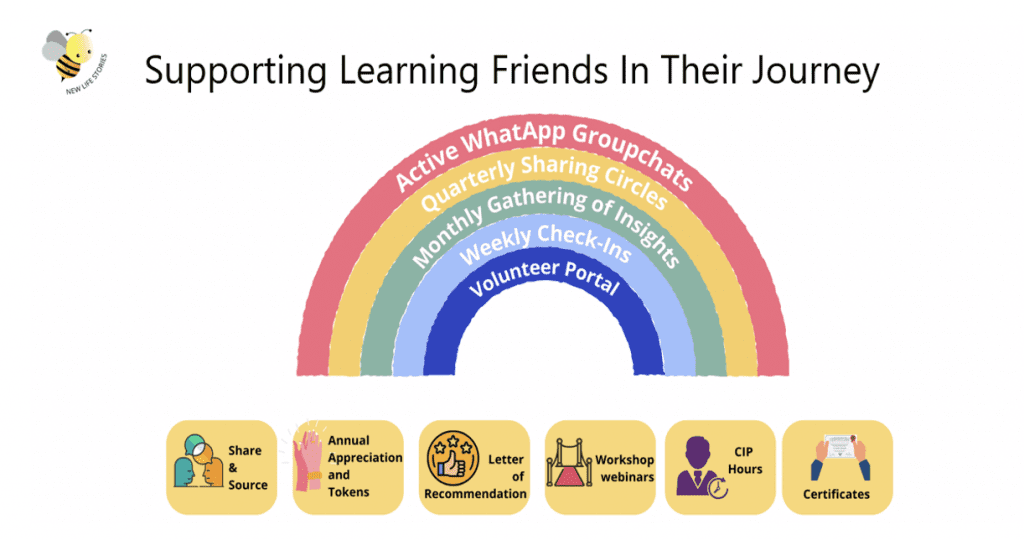
To facilitate this relationship between Learning Friends and their Early Readers, NLS applies a slew of comprehensive volunteer training and management tools.
NLS has designed an in-house training programme on trauma-informed care and restorative conversations. This training enables Learning Friends to develop better communication with those around them and to deal with or manage challenges when interacting with the children. Bolstering this, NLS’s senior Learning Friends come together to share experiences and best practices with new members.
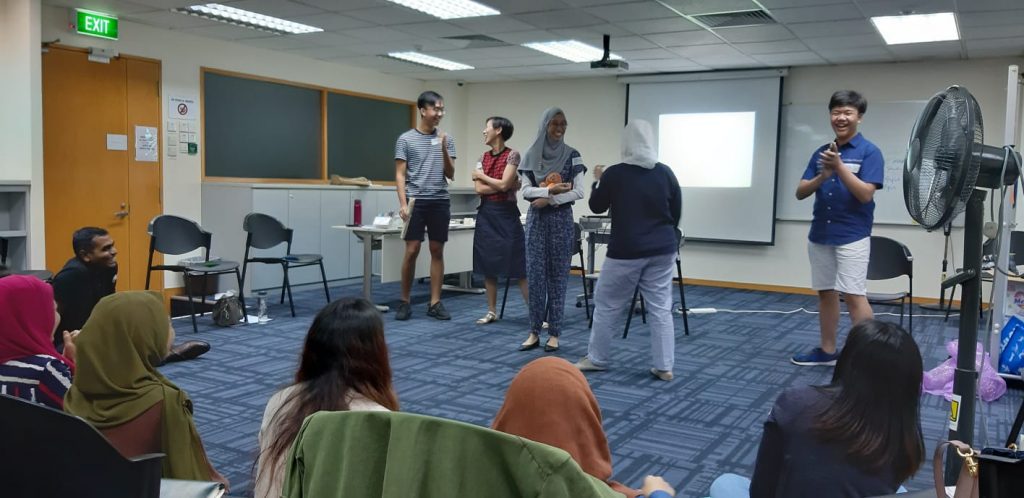
However, ensuring the right training and matching to build sustainable relationships is not enough. There is a need to support Learning Friends throughout this journey.
“We believe in providing holistic and thorough support for our learning friends whether they are active or ad hoc” says NLS’s Volunteer Relations & Resource Manager Noorfaiza Hassan (Faiza). Be it their Learning Friends or volunteers who help pack and deliver care packages or write thank you cards, NLS ensures this support through regular check-ins, accessible resource support, and effective communication channels.
Learning Friends do not work alone. They support and are supported by NLS’s Volunteer Relations Team and their professional counsellors. Through periodic volunteer meetings called Sharing Circles and regular check-ins, NLS ensures that their LFs’ concerns are heard and addressed, while providing a platform for mutual sharing and learning. Through such peer support, or as Faiza terms as a “trust circle”, avenues for support and guidance are readily available for their volunteers. Trust is also deepened amongst volunteers, who occasionally need to work together.
This support is strengthened through NLS’s volunteer online portal, where resources, articles, event updates, and sample activities volunteers can adopt to engage the children are found. NLS also utilises Whatsapp chat groups to enable smooth communication between Learning Friends, the child’s family, and the Volunteer Relations Team.
Through their journey with NLS, Learning Friends are also given opportunities to lead other volunteers and empower them through Sharing Circles and building relationships between new and existing volunteers. They are not passively fulfilling their duties but actively contributing by supporting and empowering fellow volunteers.
Retention and Advocacy
Creating long-lasting relationships between Learning Friends and the children is important. The Learning Friend journey focuses on consistent, active and long-term engagement to retain volunteers through recognising their time, effort, and dedication.
Faiza explains, “We [NLS] believe in adding personal touches to make our volunteers feel genuinely valued”. This looks like practical gifts such as customised EZ-Link cards or personalised greeting cards during festive seasons.”
Uniquely, NLS harnesses its volunteers to be advocates for their cause. Learning Friends are invited to share their stories through NLS’s social media platforms and be a part of social media campaigns. Learning Friends are also empowered to co-facilitate events and experiential learning journeys with their respective families.
“This not only helps to spread awareness for our programme and initiatives, but also develops shared life experiences within the volunteer network in NLS where they will gain mutual understanding and respect for each other.”
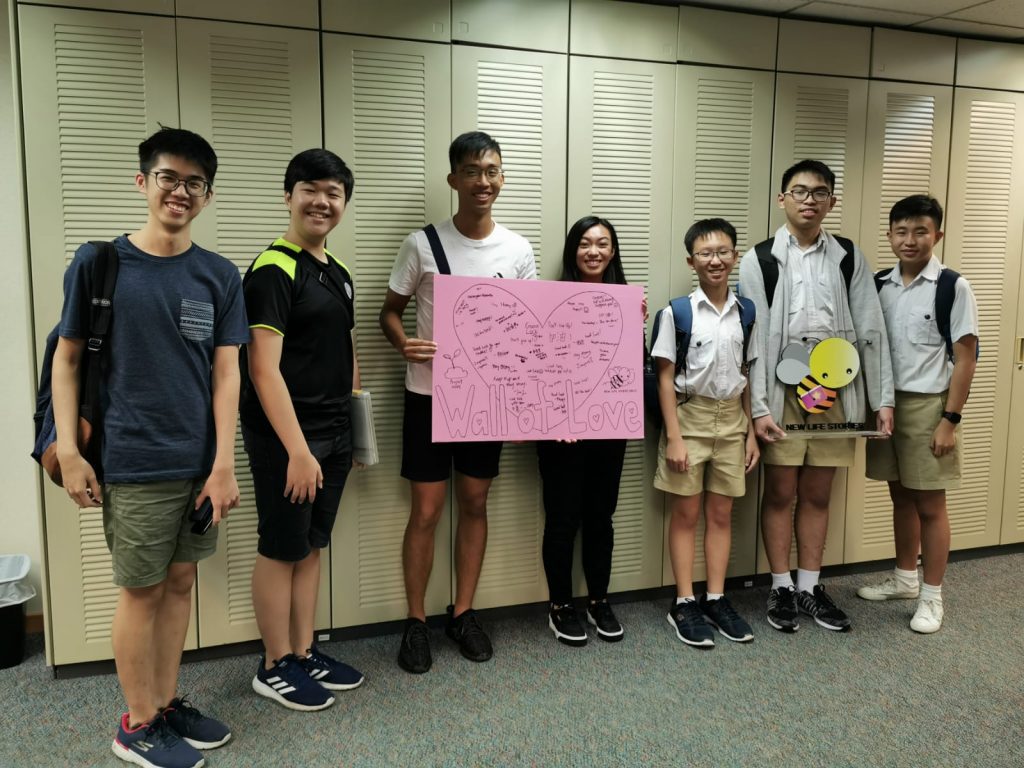
Through recognising the contributions of their volunteers, NLS increases advocacy for their mission while attracting future volunteers. This translates into something bigger than the individual.
“When our volunteers are happy and enjoy themselves while partnering us in this journey, the kids will feel overjoyed too, having to spend their moments with their buddies, their Learning Friends.”
Having a Unique Community Journey
In creating an integrated and customised volunteer journey plan, NLS enables volunteers to serve the children well and also empowers volunteers to develop themselves.
Quoting Henrik Ibsen, Faiza shares, “A community is like a ship; everyone ought to be prepared to take the helm.” Given relevant training and skills, as well as the opportunities to use this new knowledge, NLS is able to motivate extraordinary commitment and dedication from its Learning Friends within its community circle.
Each step of NLS’s volunteer journey is crafted specifically in line with its bigger mission. Having a volunteer framework that enables them a clear, directed method in addressing any concerns when developing or participating in their community assures not only volunteers but more importantly translates into benefits for the children.
Through this, NLS is truly able to support these families and create new life stories!
Reflection Questions:
- Are there any practices unique to your community? How do they benefit your overall mission?
- What are some aspects you believe your community can improve on?
- How can members of your community be empowered to do more?
- What can be done to develop a better experience for your community members?
You can learn more about NLS and the work they do here.
Interested in developing your community further? Bring together developers and members to kickstart this process with the help of these resources.
